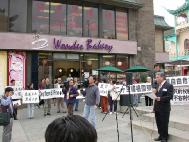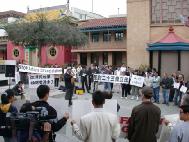Los Angeles Chinese Community Rallies to Strongly Oppose Article 23 Legislation (Photos)
(Clearwisdom.net)
The Hong Kong government's Article 23 anti-subversion law legislation has also affected the overseas Chinese. The Los Angeles Chinese community responded quickly. Eleven US-based Chinese groups with Hong Kong, Taiwan and Mainland backgrounds assembled on December 14th in Chinatown and held a press conference to express their strong opposition to the Hong Kong Basic Law 23 legislation.
The groups participating in the rally included the Global Coalition Against Article 23 Legislation Preparation Committee, the Hong Kong Discussion Forum, the Chinese Democracy United Alliance, "Chinese Business" Magazine, the Chinese Social Democratic Party US West Branch, Mainland China Political Asylum Association US West Branch, the Chinese Human Rights Group, Overseas Chinese Democratic Peace Alliance Los Angeles Pledge, the Visual Artist Association, Southern California Falun Gong Practitioners.
Drafted after 1989's democratic movement in China, Article 23 stipulated that "the Hong Kong Special Administrative Region shall enact laws on its own to prohibit any act of treason, secession, sedition, subversion against the Central People's Government, or theft of state secrets, to prohibit foreign political organizations or bodies from conducting political activities in the Region, and to prohibit political organizations or bodies of the Region from establishing ties with foreign political organizations or bodies."
Since 1990, Beijing exerted pressure several times on the Hong Kong government, attempting to enact Article 23 legislations, which encountered intense opposition by the people of Hong Kong from all walks of life. In this September, the Hong Kong government proposed Article 23 legislations again and firmly refused to submit a White Bill for review. The legal document presented was fuzzily written and lacked concrete details, and the government stipulated only a three-month consultation period.
The Chinese people attending the rally pointed out that this signified the end of "the one country two systems" policy. Once again it demonstrated to the world that the Jiang regime's promises cannot be trusted.
Mr. Feng Guojiang of the Mainland China Political Asylum Association US West Branch lived in the Mainland for 35 years and Hong Kong 10 years. He recollected that before taking over control of Hong Kong, the Chinese government promised that the handover was "just changing a flag, the horse will still run and the dancer will still dance." He made an analogy that the past five years in Hong Kong was just like a screw that had been gradually tightened up -- they didn't try to change everything right away, but gradually turned up the pressure.
Global Democratic Peace Alliance Li Mutong pointed out that the Mainland in fact should learn democracy from Hong Kong, not the other way around. Democratic freedom is a precious thing. Article 23 will not only violate China's pledge of "one country two systems" but also set back history.
The conference participants indicated that Article 23 was carelessly legislated and that journalists would be severely affected. The self-censorship will be even more severe.
"Article 23 will clamp down on the media like invisible locks." Feng Guojiang said, "Since Hong Kong's handover, the newspapers already do not dare to speak. After Article 23, the remaining few that dare to tell the truth will be too scared to speak up."
UCLA Professor Wu Yingnian compared Article 23 to the Nazi law to persecute the Jews: they may arrest anyone arbitrarily who holds different opinions any place any time in Hong Kong and ban any groups suppressed in the Mainland. He thought that Article 23 was the extension of the police's false accusations against Falun Gong practitioners in June. Professor Wu pointed out that patriotism does not equate to always agreeing with government policies, and Article 23 intentionally blurs that distinction.
Alex Wang of the Hong Kong Discussion Forum Alice expressed his worries for overseas Hong Kong people: Hong Kong's permanent residents, no matter whether they had immigrated or not, if they were found that they have violated Article 23, then they could be extradited back to Hong Kong for prosecution. Not only that, foreigners who go to Hong Kong are included in Article 23's jurisdiction. He noted that the Hong Kong government is pushing Article 23 instead of addressing the economy and unemployment, undoubtedly trying to undermine people's human rights and freedom.
Pomona College student Leeshai Lemish frequently traveled between USA and Hong Kong. He said: "Perhaps because the Beijing government did not like what I wrote and did, I can therefore no longer go to Hong Kong. I have many friends in Hong Kong; some practice Falun Gong, some work for media agencies. If Article 23 becomes law, Jiang would be very eager to send them to forced labor camps. I really cannot imagine that they would be sent to forced labor camps for their peaceful beliefs and actions."
Visual Artists Association President Ken Aaron pointed out, "The government should benefit the people, not control people to form a police state."
The activity's organizer, Los Angeles Hong Kong Discussion Forum spokesperson Guan Shuyue pointed out, this assembly is only the start of the Los Angeles Chinese people's actions against Article 23. The Hong Kong Discussion Forum will continue to collaborate with other organizations to conduct more activities to stop the enactment of Article 23.

